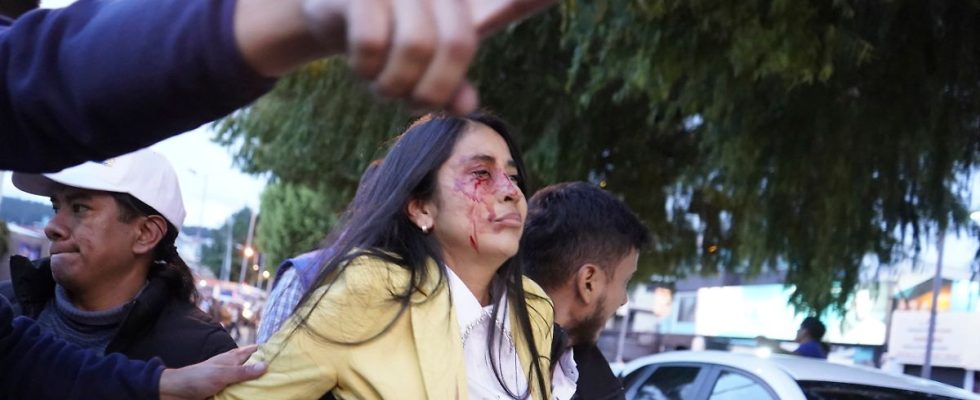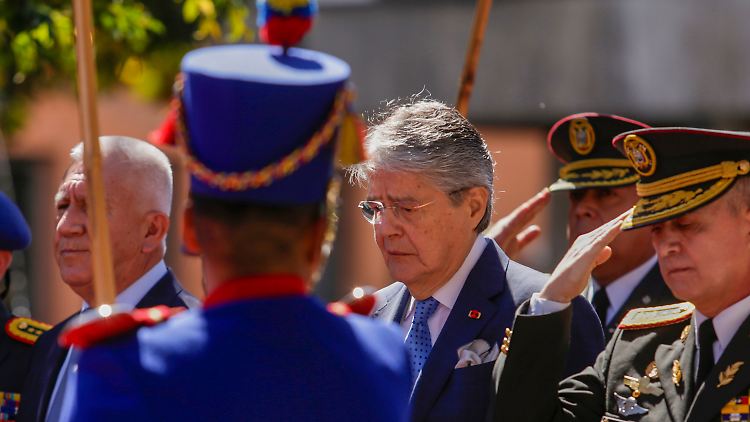Murder on the drug battlefield
Lead in Ecuador, cocaine in Germany
By Roland Peters, Buenos Aires
08/12/2023, 8:02 p.m
No other country brings more cocaine to Europe than Ecuador. Drug cartels drive murder rates to record highs. A presidential candidate was riddled with bullets. He had publicly criticized the criminals. Who is responsible?
All transparency and police protection did not help: the Ecuadorian presidential candidate Fernando Villavicencio has been dead since Wednesday and has now been buried. The former investigative journalist had previously spoken publicly about death threats against himself and his employees for days. The Ecuadorian police are investigating together with the US FBI: who is behind it? Who had what interest in Villavicencio’s demise?
This was planned, that much is certain: At 6:20 p.m., Villavicencio leaves an election campaign rally in a school in the capital, Quito. Security guards escort him to a white pickup. He had barely got in when an attacker riddled the 59-year-old politician with about 40 shots through the opposite, undarkened car window. The security forces shoot at the assassin, who later dies from his injuries.
Villavicencio is the best-known victim of a growing wave of violence that has been sweeping the South American country on the Pacific for several years. Since 2018, the homicide rate has quadrupled to an all-time high. 2023 is also expected to end with a new negative record. Mexican, internationally active drug cartels and their Ecuadorian allies are particularly responsible. Last year the government declared a state of emergency for the three coastal regions with drug routes to the important port city of Guayaquil. Now it applies to all of Ecuador.
Balkan mafia involved in export
In no other country in the world is as much cocaine and variations per inhabitant moved as in Ecuador. In recent years, the country on the Pacific has developed into a key export country for drugs – both to the USA and to western and central Europe. According to the UN anti-drug agency UNDOC, Ecuador has become the most important hub for shipments to Europe.
According to investigators, a key role is played by the Albanian mafia, whose members help organize exports in Ecuador and imports in the Netherlands. 30 percent of the deliveries intercepted in Europe came from the country on the Pacific. Based on the quantities confiscated along the North Sea route, Antwerp, Rotterdam and Hamburg are the most important landing ports. A second route leads to Portugal and Spain.
The cultivation of the coca plant in South America – this is how the potential production volume is estimated – almost tripled between 2013 and 2021. Almost the entire world is supplied by Bolivia, Colombia and Peru. Cocaine is also produced in Colombia’s southern provinces of Putumayo and Nariño, which border on Ecuador. The mountainous jungle regions are an open gateway for smugglers.
Villavicencio campaigned against “narco-politics,” railing against a “criminal economy financed by drug smuggling and illegal mining,” and “bribery and corruption in the public sector.” When he received death threats last week, he said: “I’m not afraid.” This may have cost him his life.
Armed groups fighting for influence and income from the cocaine trade in Ecuador are suspected of being behind the murder. Especially where they compete for dominance over transport routes: from the border of the largest producer country, Colombia, to the city of Guayaquil and its important seaport. It is estimated that up to 800 tons of cocaine are shipped from Ecuador every year. The country has become a drug battleground.
Corruption and “Mutual Death”
Dozens of people have already been killed during the election campaign, including a mayor and a parliamentary candidate. There were also prison riots and bombings. Villavicencio had publicly accused the criminal network Los Choneros and its head Fito of receiving death threats. Among other things, the Choneros are active in drug smuggling and are allied with the Mexican Sinaloa cartel, one of the most powerful in the cocaine trade in the Americas. They are at enmity with the other major Mexican cartel, “New Generation Jalisco,” which works with other criminal groups in Ecuador.
“Los Lobos”, the wolves, are allied with Jalisco: after the murder, masked people confessed to the murder of the politician in a video and described themselves as its members – which others, without masks and in peaceful white, denied in a subsequent video . Police arrested six suspects from Colombia on Friday. The US FBI is to help investigate the background to the crime. Possibly to investigate the involvement of the Mexican cartels, which are also active in the USA.
According to the UN anti-drug agency UNDOC, cocaine production is at record levels; production becomes more effective, smuggling more varied. At the same time, the demand and the volume of confiscated drugs are increasing. In Ecuador, the Mexican Sinaloa cartel and the competing “Jalisco of the new generation” for the USA, which also organizes distribution there, and mafias from the Balkans for Europe have a hand on the export routes.
Fearless corruption hunter and candidate
Ecuador’s presidential elections will be held on August 20, only because a commission chaired by Villavicencio accused incumbent President Guillermo Lasso of embezzling public funds. Before the vote on his removal from office, Lasso pulled the last ace out of his sleeve in May, triggering parliament and thus new elections for the presidency. The so-called “mutual death” (muerte cruzada) gave him another six months at the head of state.
Villavicencio had already convicted former President Rafael Correa of corruption. He was involved in an investigation to uncover an extensive corruption network in which Correa was involved. Correa ruled the country between 2007 and 2017 and was put on trial as a result of the research. But the ex-president fled to Belgium. In absentia he was sentenced to eight years in prison.
The presidential election will take place as planned. At least 40 percent of the votes and a 10 percent margin over the runner-up are required to win the first ballot, otherwise there will be a runoff. The last polls were allowed to be published on August 9th. Around half of the voters were undecided on who they would vote for. Leading the way was the candidate close to Correa. Villavicencio was one of the five most popular candidates.


